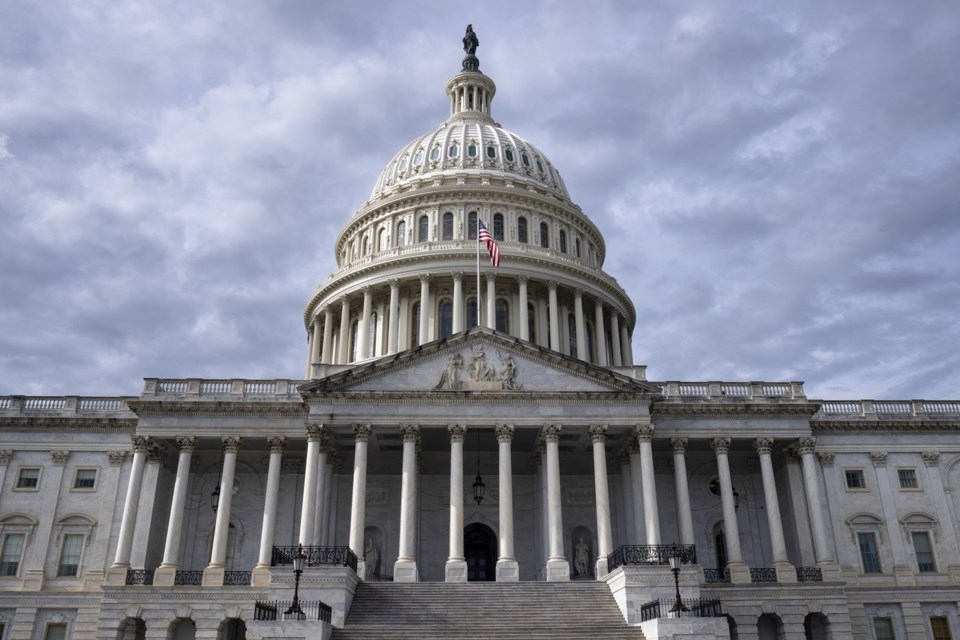WASHINGTON (AP) — Keeping the federal government open. Providing more disaster aid. Passing a defense policy bill. And for Senate Democrats, confirming more judges.
It's a short but important to-do list as Congress returns to Washington this week to begin what is known as a lame-duck session — that period between Election Day and the end of the two-year congressional term.
Republicans are anxious to turn the page and move on to next year when they'll have control of the White House and possibly both chambers of Congress, while Democrats hope to get in as many of their priorities as they can while they still have the majority in the Senate.
Here's a look at where things stand going into the final weeks of the tumultuous 118th Congress:
Funding the government
Just before lawmakers left Washington in September, they passed a short-term extension of government funding to avoid a shutdown before the election. They still need to pass full-year spending bills for the current fiscal year, or at least another extension, by Dec. 20.
A Republican aide in the House and another in the Senate not authorized to speak publicly about internal planning said it is likely that Congress will pass another short-term extension into early next year rather than complete work on the bills.
That's because the two sides still have major differences on spending levels and policy priorities. Also, Republicans have less incentive to negotiate now because they will have control of the White House, Senate and possibly the House come January.
Much will depend upon whether government funding is a fight President-elect Donald Trump really wants to take on in his first few weeks as president or whether he'd prefer to focus on other priorities.
Under terms of a previous deal that then-Speaker Kevin McCarthy reached with the Biden administration, spending for defense and nondefense programs would rise 1% this fiscal year.
The Senate has been charting a course to go above that level, while House Republicans have been voting for steep cuts to many non-defense programs, and they have attached policy mandates to the spending bills that Democrats overwhelmingly oppose. So a final agreement will be difficult to reach this Congress.
Disaster Aid
Congress replenished the Federal Emergency Management Agency 's disaster relief fund with more than $20 billion in September. But that money is being spent quickly in the wake of Hurricanes Helene and Milton.
Congress is expected to take up a supplemental disaster funding package at some point during the lame-duck. But, for now, lawmakers are awaiting a request from the Biden administration on what additional money will be needed for FEMA's disaster fund and for other disaster aid programs, such as Small Business Administration program that provides low-interest loans to businesses and homeowners hit with property damage. The program ran out of money in mid-October, though the agency continues to take applications, so it can move quickly when Congress does provide funding.
Lawmakers are expecting a hefty request.
When visiting North Carolina after Hurricane Helene, House Speaker Mike Johnson said Congress provided money to meet immediate needs and would at the appropriate time "act in a bipartisan fashion to supply what is needed to help these communities recover, the appropriate amount that the federal government should do.”
Defense Bill
Congress for more than six decades has passed an annual defense policy bill that authorizes specific weapons systems and sets troop strength and pay levels.
The House passed its $895.2 billion measure in June. That amounts to a 1% increase from the last fiscal year, an amount in keeping with the spending caps set by the McCarthy-White House agreement. The measure provided a 19.5% boost in pay for junior enlisted service members and a 4.5% increase for other service members. But the measure was also filled with scores of conservative policy mandates, including overturning the Pentagon's policy of reimbursing transportation expenses to service members for travel out of state for an abortion.
The inclusion of culture war provisions turned what is typically a bipartisan bill into one that the vast majority of House Democrats opposed.
The Senate version would authorize about $919.9 billion in spending. The bipartisan measure passed out of committee in July, but has not been brought to the floor as Democrats reserved precious floor time for other priorities. But behind the scenes, lawmakers have been negotiating to reconcile the differences in the two bills.
Judges
Democrats have made confirming judges a high priority after watching Trump get 234 judges confirmed during his first four years in office.
So far, the Senate has confirmed 213 of President Joe Biden 's judicial nominees, and a committee spokesman said the chairman, Sen. Dick Durbin, D-Ill., aims to confirm every nominee possible by the end of the Congress. Seventeen nominees are pending on the floor and several more are pending in committee.
It's possible that Biden could beat Trump's overall number, but Trump still gets the edge when it comes to the most important nominations — those to the Supreme Court, with Trump appointing three and Biden appointing one. Trump also had more appellate court judges confirmed.
Senate Majority Leader Chuck Schumer, D-N.Y., has already lined up votes on two judges next week, an indication of the priority Democrats are placing on the issue during the lame-duck.
Kevin Freking, The Associated Press




